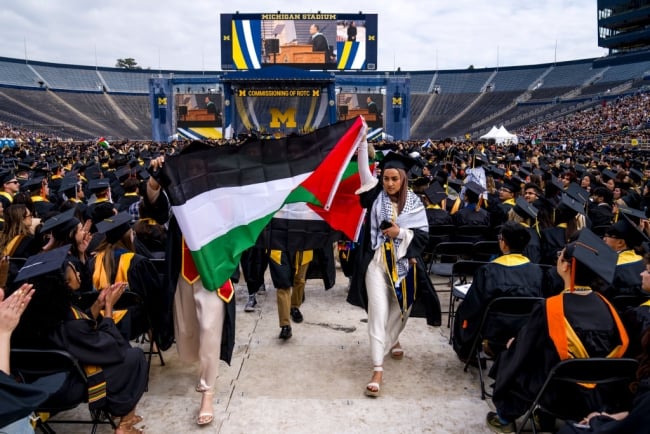You have /5 articles left.
Sign up for a free account or log in.

Pro-Palestinian protesters interrupted the May 4 commencement ceremony at the University of Michigan. On Tuesday, police dismantled a four-week-old encampment.
Photo by Nic Antaya/Getty Images
Protest encampments established by pro-Palestinian students may be dwindling on U.S. campuses as the academic year draws to close, but they have not disappeared entirely. And the administrative response to such encampments continues to vary, with some college leaders reaching peaceful agreements with protesters and others calling in law enforcement to arrest and remove students.
Police Act at Michigan
At the University of Michigan, police officers stormed Central Campus early Tuesday morning and dismantled a village of tents, signifying the end of a four-week demonstration at the state’s flagship in Ann Arbor.
Join us Thursday for live coverage of the latest House antisemitism hearing, starting at 8:45 a.m.
In a public statement released shortly after the raid, Michigan president Santa Ono said he had no choice but to take action after the protesters refused to remove fire hazards discovered during a fire marshal’s inspection last week.
Until then, administrators had largely taken a hands-off approach, even allowing the encampment to continue after pro-Palestinian activists interrupted the university commencement ceremony on May 4. But according to The Detroit Free Press, tensions escalated in recent days as protesters staged demonstrations outside the homes of some university regents, including the Chair.
“When it comes to freedom of speech, the right to assemble, and the right to protest peacefully, the University’s commitment has been, and will remain, unwavering,” Ono said in his statement. “But those rights are not limitless.”
He added that ensuring the safety of all campus constituents is a “paramount concern,” noting that the fire marshal had “determined that were a fire to occur, a catastrophic loss of life was likely.”
University spokesperson Melissa Overton told The Free Press that officers issued three warnings over a 15-minute period before they took action, asking participants to leave voluntarily or face the possibility of arrest. She did not specify whether any protesters were detained.
The TAHRIR Coalition—the student group that set up the encampment and which advocates for divestment from “settler colonialism, apartheid and genocide”—said three demonstrators were arrested. A video the group posted on X shows a swarm of students colliding with a line of police officers wearing face shields and riot gear. Some officers appear to be using pepper spray to break up the crowd.
Deal Reached at Wesleyan
Meanwhile, students at Wesleyan University in Connecticut voluntarily packed up the remains of their encampment on Monday after striking a deal with administrators, who agreed to consider divesting the university’s endowment from companies in Israel as well as those with ties to the war in Gaza.
Under the agreement—which brought an end to the 20-day occupation of Wesleyan’s north campus—the Board of Trustees pledged to vote on proposed changes to its investment policy as early as Sept. 22, according to The Hartford Courant.
Several other institutions, including Bard College and The New School—as well as Brown, Northwestern and Rutgers Universities—have reached similar deals. Now the presidents of Rutgers and Northwestern will have to explain their decision Thursday during testimony before the U.S. House Education and Workforce Committee, where they will appear with the chancellor of the University of California, Los Angeles.
Student organizers from the Wesleyan chapter of Students for Justice in Palestine said in a statement on social media that the deal with administrators, which includes a commitment to transparency about the university's investment portfolio, is promising but ultimately falls short of their desired goals: a formal commitment to divest and a boycott of Israeli academic institutions.
Luné Maldonado, a Wesleyan freshman who serves as a communications strategist for the Wesleyan Palestine Solidarity Encampment, told The Courant that student protesters plan to return “stronger than ever” in anticipation of the Board of Trustees divestment vote this fall.
“If they say no, we’re ready with the actions appropriate to show the administration that we will not take no for an answer,” Maldonado said.
Drexel Poses an Ultimatum
Elsewhere, administrators at Drexel University seem to be taking the more commonly used middle-of-the-road approach, threatening to use whatever force is necessary to clear the student encampment from the west Philadelphia campus but without actually making a move to do so, as the University of Michigan did.
In a statement Monday night, Drexel president John Fry said protesters had disrupted the university’s academic functions by creating a hostile environment, subjecting passersby to antisemitic speech and “unacceptably” targeting individual faculty and staff members. The campus had been put on lockdown the night before, with classes Monday held virtually and many employees working from home.
Student protesters “cannot be allowed to remain in place,” Fry said, adding that he was prepared to take “all necessary steps to clear the encampment safely.” He did not, however, say when that might happen.
The Drexel Palestine Coalition gave no immediate response to Fry’s ultimatum.
Classes began “a phased return to normal operations” Tuesday morning.




